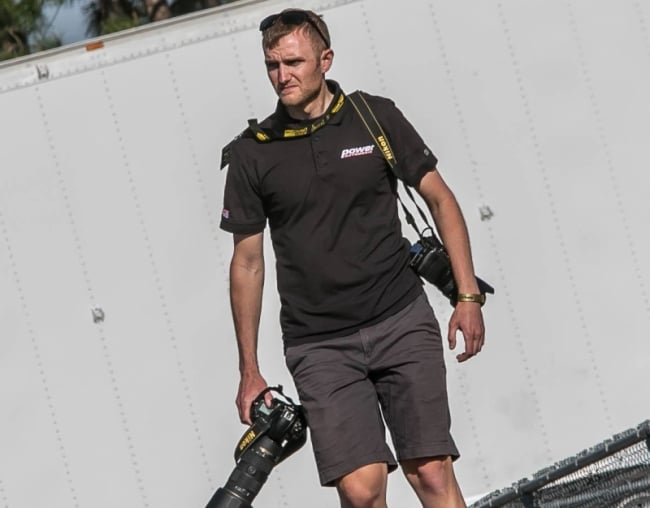For years, traditional drag racing fans spoke unfavorably of the cast of the Street Outlaws reality show, calling into question the capabilities of “a bunch of TV stars” and the true performance of their cars—often referencing them as “not real drag racers.”
In a span of three days, Kye Kelley silenced every last one of them.
Kelley, one of Street Outlaws’ top stars since smashing his way onto the scene with a Cash Days win in 2015, drove his supercharged Camaro past the strongest field of Pro Modified entries ever assembled in the history of the sport to capture one of the most improbable wins at the Snowbird Outlaw Nationals at Bradenton Motorsports Park Sunday evening.
Kye’s driving ability was never in question. In the weeks leading up to the event, he suggested that while his Camaro wasn’t up to par for the standard of the class, he’d take the tree down on anyone he got the opportunity to line up with.
Before winning even a single round, Kye had already earned the respect of everyone in the field and the drag racing community at large. On paper, he brought a knife to a gunfight. His third-gen Camaro, built by Wizard Race Cars, is just 104 inches in wheelbase, a full 11 inches shorter than the 63 other entries that he raced against. Those 11 inches are significant in weight balance and weight transfer, as well as drivability.
Likewise, the fact the car features steel roof and quarters (a No Prep Kings requirement) has been oversimplified on social media; a car can feature steel body panels that have been reshaped to any dimensions, but Wizard owner Jason Wood confirmed to DRAGZINE that Kye’s Camaro is factory dimensions in width and height, meaning it punches a larger and less efficient hole in the air. The nose is factory in appearance, even sporting the very un-aero inset Camaro headlights that work and were turned on at night. This fact is evidenced by his trap speeds that consistently lagged more than a mile-per-hour behind the next fastest car in the field.
Kelley had the new car built in secret and revealed it this summer, sharing that the significance of the new build was a lighter overall package that would help him move weight around to achieve a desired balance. The lightweight car also helped him get down to the minimum weight for his screw supercharger combination at the Snowbirds, including the 35-pound bonus for using steel roof and quarters.
Despite all those mechanical disadvantages, Kye powered his Camaro to a stunning 3.621 at 207.21 mph to qualify 13th in the tightest, most competitive field of Pro Modified cars of all-time. The entire 32-car field was spread between top qualifier Mark Micke’s 3.591 and an anchor 3.647 — a mere .056 seconds. You’d have to go back some 25 or 30 years to find a steel-body car racing this competitively at a major Pro Modified race … and perhaps equally as long to find a third-gen F-body car of any material makeup. But then he defeated Mick Decker, Jr. in the opening round, and son Mike Decker III in the second round in a tight 3.661 to 3.662 drag race. Could he?
A win was still outrageously unlikely, even at eight cars … until it wasn’t. Kye gradually rekindled that low-3.60 magic from qualifying and drove by heavy-hitters Spencer Hyde, Kurt Steding, and Ken Quartuccio in the final round to pull off one of the greatest feats of this or any decade. That an unoptimized car like this one could win a Pro Modified race of some kind wasn’t necessarily unlikely, but one this stacked was seemingly impossible.
But about those driving skills.
Where Kye’s car lacked performance—and that wasn’t often—the Mississippi native made up for it with his trigger finger. Kelley had the best reaction time of three of the five rounds, and two of the three-best reaction times all of raceday; he was .012 in round two, beat Hyde on a holeshot, 3.626 to 3.624 with an .013 lights in the quarterfinals, and Steding on a massive holeshot in the semifinals, 3.620 to a much quicker 3.592.
When it mattered most, tuner Jeff Pierce found the performance. In the final round, Kye clocked a career-best 3.594, the second-quickest pass of eliminations, third-quickest of the event, and a run that and would have qualified him third a day earlier. Needless to say, none of this was supposed to happen.
For his incredible efforts, Kye earned a sizable $50,000 payday. But he earned enough respect to far outweigh each of those dollars and a moment in history that will not be soon forgotten.






















